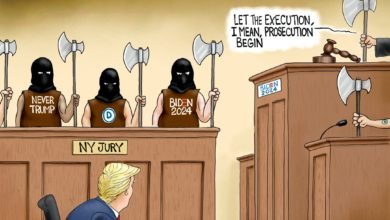The Education of Henry Hazlitt
Henry Hazlitt was not an economics professor. Yet he was one of the greatest economics educators in history. Through his books (like his bestselling Economics in One Lesson) and articles (like his New York Times editorials, Newsweek columns, and Freeman essays) written for popular audiences, he helped more people think like an economist and understand the market than the vast majority of tenured econ dons.
Hazlitt also did not hold a PhD in economics or even a bachelor’s degree. Yet, he was widely regarded by his peers and by posterity as an economist: and a superb one at that. The great journalist H.L. Mencken hailed Hazlitt as “one of the few economists in history who could really write.” And the great economist Ludwig von Mises deemed Hazlitt to be “the economic conscience” of America.
Hazlitt’s grasp of the market was more sound than that of the majority of economists during his lifetime and since. For example, he wrote a book that thoroughly refuted the economics of John Maynard Keynes (the hero of the economics profession at the time), revealing Keynes’s “magnum opus” to be a turgid tissue of fallacies.
How did Henry Hazlitt become a world-renowned economist and economics educator outside of the Ivory Tower?
The School of the Market
At one point early in his life, Hazlitt had his sights set on the Ivy League and an academic career. As he recalled at his 70th birthday celebration:
“In the last year of high school, I developed what I suppose might be called intellectual awareness. I got interested in philosophy and psychology. My great gods were Herbert Spencer and William James. I was going to go to Harvard, and major in psychology, and become a professor of psychology, writing a little philosophy on the side, like William James. But none of this was to be, because of something called a shortage of funds. So I had to compromise by going to the College of the City of New York, where the tuition was free. But even after a few months there I had to face the fact that I had to quit college and go to work to support my mother as well as myself.”
This stringency was due to his father and his later stepfather both dying young. Hazlitt had to start at the bottom, doing menial work far below his lofty ambitions. But he didn’t let his pride get in the way of making the most of whatever opportunities were available to earn, learn, and work his way up. As Bettina Bien Greaves wrote in her biographical profile of Hazlitt:
“An inexperienced high school graduate wasn’t worth much on the job market. The only work for which Henry was then qualified was as an office boy at $5 a week. He was fired from his first job after only two days. But that didn’t faze him. He simply went out and got another job.”
This was possible because the bottom rungs of life’s ladder had not yet been removed by government intervention.
“At that time there were no legal obstacles to hiring and firing—no minimum wage with which an employer had to comply, no Social Security or unemployment taxes to pay, no income taxes to withhold, no restrictions on hours or working conditions. Any would-be employer could hire anyone who wanted to work. If the arrangement didn’t work out, the employer could let the employee go without penalty. Or the employee could leave, confident that he could easily find other employment.
Henry had a succession of jobs at $5 per week. When he learned that secretaries could earn $15 per week, he determined to learn shorthand and typing. For several weeks he attended a secretarial school. With his newly acquired skills, he could command $10 to $12 per week.”
Apprenticeship at The Journal
“However,” Hazlitt recalled, “I hadn’t given up the idea of being a writer. I thought the best way to be that and still earn a living was to get on a newspaper.”
So he leveraged his secretarial skills to land a job as a stenographer at The Wall Street Journal.
“The Journal at that time,” Greaves related, “was much smaller than it is now, and it reported primarily Wall Street news. Hazlitt’s bosses at The Journal dictated editorials to him on the typewriter and reporters called in their stories to him over the phone. Gradually he learned through on-the-job training.”
Hazlitt still wasn’t a writer yet, but he was learning to become one by supporting and apprenticing under writing professionals. Eventually his persistence paid off and an opportunity to try his own hand, “cut his teeth,” and prove himself as a writer arose. As Greaves related:
“The Journal at that time had a ‘By-the-Way’ column, composed of brief quips about current events. Members of the staff were encouraged to submit entries anonymously. To collect payment if an entry was used (75 cents per published entry), the author turned in the carbon copy of his entry. With Henry’s gift for expression, he soon became a persistent contributor and in time almost doubled his income with what he received for his short, clever “By-the-Way” paragraphs.”
Self-Education and Success
Hazlitt also continued to pursue his scholarly interests on his own and on the side. As Greaves wrote:
“Henry Hazlitt was energetic, ambitious, and industrious. On-the-job training wasn’t enough for him. He was determined to get the education he had missed when he had to drop out of college. So he started his own reading program. He read about Shakespeare and the Marlowe controversy. He learned about evolution and the role of the state by reading Herbert Spencer. (…) In time, the depth and breadth of his reading gave him a broad liberal arts education.”
At first, his studies were far removed from his work as a business and finance journalist. As Hazlitt wrote:
“I was supposed to know something about business and finance. I knew nothing about business or finance — and, moreover, I hadn’t the slightest ambition to learn. My head was in the clouds, dreaming of philosophy. Every evening — in all the time I could spare, anyway, from dancing and entering dance contests — I was secretly writing a book with the ambitious title of Thinking as a Science.”
But eventually, Hazlitt’s two worlds converged:
“In order to hold my job, I finally did get around to reading books on business and finance, and I began to read the standard economic textbooks of the period. Then I made the amazing discovery that economics required just as much hard thought, subtle thought, precise thought as the most abstruse problems of philosophy or psychology or physical science. A while later I stumbled upon a wonderful book in the public library. (…) The book was titled The Common Sense of Political Economy by Philip H. Wicksteed. For the first time, the world of economics really opened up to me, and I caught my first glimpse of the fact — which Ludwig von Mises was later to make much more explicit — that the world of economics is almost coextensive with the whole world of human action and of human decision.”
Hazlitt made many such discoveries at the library, which was central to his self-directed studies. As he wrote:
“No practice excels that of browsing along a library shelf containing books on the subject that has awakened your interest, and sampling them. If I may be permitted a personal note, it seems to me, looking back, that the hours of purest happiness in my own youth were spent in just this way. I would avidly sample one book after another, and when the bell rang, and the library closed for the night, and I was forced to leave, I would leave in a state of mental intoxication, with my new-found knowledge and ideas whirling in my head.”
Hazlitt didn’t need Harvard after all. As Will Hunting (Matt Damon’s self-taught genius character in the movie Good Will Hunting) told a haughty but uninspired Harvard student who had tried to belittle his friend, “You wasted $150,000 on an education you could have got for $1.50 in late fees at the public library.”
Then Hazlitt finished writing Thinking as a Science and sought to get it published. As Greaves related:
“He submitted the book to five publishers, received five rejections, and got discouraged. Then a high school friend urged him to send it out once more. He did—and this time it was accepted by the well-known firm of E. P. Dutton & Co.”
Once again, Hazlitt’s passion and persistence paid off.
That same year, Hazlitt left The Journal for a job as a Wall Street correspondent for The New York Evening Post.
At the age of 22, Henry Hazlitt—once a poor college drop-out—was a full-time professional writer and a published scholar. Through value-creation, apprenticeship, self-directed study, constant writing, and grit, he transformed his dream into reality.
A Lifetime of Learning and Teaching
But the education of Henry Hazlitt didn’t stop there. He was a lifelong student, and his studies continued to be intertwined with his professional career. In the early 1920s, while Hazlitt was financial editor of the New York Evening Mail, he cultivated the economist Benjamin Anderson as a friend, mentor, and tutor:
“I used to go to see him about once a week to talk about economic developments. I read his magnificent book, The Value of Money, which is one of the classics of American economic writing and world monetary literature. Through his incisive mind, in my discussions with him, my thought was enormously stimulated.”
It was through Anderson’s book that Hazlitt first heard of Ludwig von Mises.
“Years later,” Greaves wrote, “when Hazlitt came across Mises’ Socialism, he reviewed it in The New York Times. His review appeared in the January 9, 1938, Book Review Section…” Hazlitt called the book “the most devastating analysis of socialism yet penned” and wrote that Mises, “has written an economic classic in our time.” That review would connect the two great men, as Greaves related:
“Mises was then living and teaching in Switzerland. As a courtesy, Hazlitt mailed a copy of his review to the author and the two men exchanged a couple of brief letters. Two years later Mises came to the United States to escape the strife of World War II. Hazlitt was one of Mises’ few contacts in this country and Mises telephoned him. To Hazlitt, Mises was a “classic,” an author from a previous era. Mises’ call, Hazlitt recalled later, was almost as much of a surprise as if he had heard from such a legendary economic figure as Adam Smith or John Stuart Mill.”
Hazlitt became a close friend and benefactor of Mises, helping to secure financial support in America for Mises’s work. And Mises reciprocated by serving as yet another teacher and mentor of Hazlitt. At his 70th birthday celebration, Hazlitt said that Mises’s thought “has had more influence on me than the thought of any other single person in the last 25 years.”
From 1934-1946, Hazlitt worked for The New York Times, for which he wrote “most of the financial and economic editorials,” as he later recalled. He used that influential platform to refute the economic fallacies of the New Deal and Keynesianism, applying, honing, and sharing the economic wisdom he had attained.
Then he set out to channel that wisdom into a book that would inoculate readers against the general economic fallacy that underlies so many specific ones: the fallacy of overlooking secondary consequences. The Times gave him every other day off for three months to write it. The result was Economics in One Lesson (1946): a masterpiece of economic reasoning and education that has since become a massive bestseller and a beloved classic that has converted millions to sound, free-market economics.
Outside the Box and Beyond the Ivory Tower
Henry Hazlitt couldn’t afford entry into academia. As it turned out, that was a blessing: for him and for the world.
It forced him to forge his own education by following his passions and opportunities: to develop his own syllabus (books by Wicksteed, Anderson, Mises, and others), recruit his own “faculty” (tutors like Anderson and Mises), and determine his own “assignments” (his published articles and books).
And the results were undoubtedly better. Whereas academia tends to reward ponderously obscure prose and clannish intellectual fad-chasing (thus the rise of Keynes), Hazlitt’s economics writing (and thus his economic thinking) for “real-world” audiences was massively popular because it was sensible, direct, clear, and sound. And instead of being cloistered in the Ivory Tower, Hazlitt’s wisdom was shared widely with the world.
Should the education of Henry Hazlitt be emulated? Hazlitt was exceptionally brilliant, and his path was an outlier. But I do not believe it was an unreplicable fluke.
Most young people with an interest and aptitude for economics are shunted into academia, not because it is an efficient and effective institution for training good economists and economics educators (which it isn’t), but because it is so heavily propagandized and subsidized by the government.
If more aspiring young economists were to take Henry Hazlitt’s educational approach—based on self-directed study, apprenticeship, and “real-world” writing (and other forms of content creation) for popular audiences—they would save a lot of time and money, build better working and communication habits, and create more actual value for humanity. Public economic literacy would be much better as a result. And downstream from that would be more economic freedom and greater human prosperity.
P.S. In 2021, the education and career of Henry Hazlitt inspired me the Henry Hazlitt Project for Educational Journalism (”the Hazlitt Project,” for short) at the Foundation for Economic Education (which Hazlitt himself co-founded): an apprenticeship program that helps young intellectuals chart an educational and career course like Hazlitt’s. For more on the Hazlitt Project (which is now on its third six-month fellowship cohort), see my article “Building a Bastiat Brigade.” For more on independently learning and sharing the ideas of liberty, see the following articles of mine:
A version of this essay was originally published on my Substack Letters on Liberty.
Content syndicated from Fee.org (FEE) under Creative Commons license.
Agree/Disagree with the author(s)? Let them know in the comments below and be heard by 10’s of thousands of CDN readers each day!




